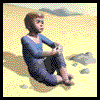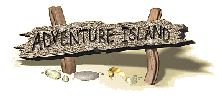What is Adventure Island?
Adventure Island was the second project from Simon Widdowson,
Digital Teacher in Residence for the Writers for the Future
project.
It is designed to fit into the
UK Yr6/7 transition unit related to the book Kensuke's Kingdom
by Michael Morpurgo, but can also be used as a stand-alone project
for other year groups and in other countries (see below).
Without needing to understand
any computer language, classes can create an online island that
other people can visit and explore. It can involve imaginative
and descriptive writing, perhaps diary or poetry writing. We
are always open to suggestions as to other applications of the
project in the classroom and ICT lab..
Pupils create challenges and puzzles
for the visitor to solve. As the visitor travels around a created
Island, descriptive writing for each area encourages them to
explore further. Will they be able to survive, and leave the
Island, or will they remain forever ... trapped?
UK schools helped us test the
pilot stage of Adventure Island, and the full web-based tool
with instructions, teachers’ notes and worksheets is now
available in the eTeachers’ Portal for teachers anywhere
to reproduce the project with their classes.
Some examples of how Adventure
Island might fit with the curriculum
Note: This refers
to the UK curriculum Literacy Framework but schools elsewhere
should be able to see how this might fit into your teaching.
Transition Year 6 / Year
7
Potentially building on reading
Michael Morpurgo’s “Kensuke’s Kingdom”
Year 6 can do a type of writing that’s very different
from their SATs and secondary schools can offer their ICT labs
and facilities to the Year 6s.
Can be combined with other ways to work on the book in drama,
art etc.
Book reviews, poems and other stories can in any case be submitted
to Kids on the Net
Yr 3 Term 3
Ob 3 Distinguish between 1st and 3rd person texts
Ob 11 To write opening to stories or chapters linked to or arising
from reading; to focus on language to create effects; e.g.....
setting scenes
Ob 12 To write a first person account
Ob 21 Use IT to bring to a published form
Yr Term 3
Ob 1 to identify social, moral or cultural issues in stories,
eg. the dilemmas faced by characters or the moral of the story,
and to discuss how the characters deal with them;
Ob 11 to explore the main issues of a story by writing a story
about a dliemma and the issues it raises for the character
Yr5 Term 3
Ob 3 to change a point of view; eg tell incident from or describe
a situation from the point of view of another character or perspective
Ob 7 to write from another characters point of view eg. retelling
an incident in [letter form]
Yr6 Term 3
On 13 to write a sequence of poems linked by theme or form,
eg. haiku (each area could have a haiku describing it)
Ob 22 to select the appropriate style and form to suit a specific
purpose and audience, drawing on knowledge of different non-fiction
text types (e.g., diary / journal type writing)
There are many other ways to fit
this project into the curriculum and we will support creative
suggestions. |



